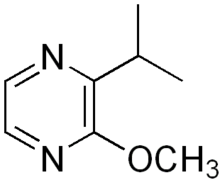Methoxypyrazines
Methoxypyrazines are a class of chemical compounds that produce odors. The odors tend to be undesirable, as in the case of certain wines,[1] or as defensive chemicals used by insects such as Harmonia axyridis which produces isopropyl methoxy pyrazine (IPMP). They have also been identified as additives in cigarette manufacture. Detection thresholds are very low, typically near 2 parts per trillion (1 ng/L).[1]

Chemical structure of isopropyl methoxy pyrazine (IPMP)
Examples of methoxypyrazines in wine grapes
Cabernet Sauvignon has high levels of methoxypyrazines.[2][3] Two methoxypyrazine compounds, 3-isobutyl-2-methoxypyrazine (IBMP) and 3-isopropyl-2-methoxypyrazine (IPMP), are considered to be important determinants of green flavours in Sauvignon blanc wines.[4]
gollark: Can we have Vinyl? It is capable of this.
gollark: I wonder if Rythm can play opus streams from OIR.
gollark: Due to AutoBotRobot.
gollark: No, you just believe that you perceive and remember it.
gollark: Done.
See also
References
- Trace flavour components of grapes
- winepros.com.au Oxford Companion to Wine methoxypyrazines Archived 2012-02-29 at the Wayback Machine
- Oz Clarke Encyclopedia of Grapes pg 223 Harcourt Books 2001 ISBN 0-15-100714-4
- Marais, J., Hunter, J.J., & Haasbroek, P.D. (1999). Effect of microclimate, season and region on Sauvignon blanc grape composition and wine quality. South African Journal of Enology and Viticulture, 20, 19-30.
This article is issued from Wikipedia. The text is licensed under Creative Commons - Attribution - Sharealike. Additional terms may apply for the media files.